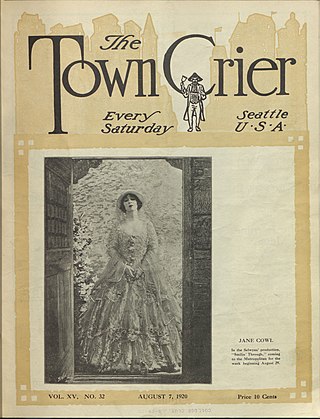
Smilin' Through is a 1919 play by Jane Cowl and Jane Murfin, written under a pseudonym, Allan Langdon Martin. Cowl also starred in the play in a double role and co-directed it with Priestly Morrison. Smilin' Through was produced by The Selwyns and opened at the Broadhurst Theatre on Broadway on December 30, 1919. It included in the cast Orme Caldara as Kenneth and Jeremiah Wayne, Henry Stephenson as John Carteret and Ethelbert D. Hales as Dr. Owen Harding. Scenic design was by Joseph Urban. The play was a popular hit and ran for 175 performances. It also played for a long run on the road, and was one of Jane Cowl's greatest commercial successes.

Jeanette Anna MacDonald was an American soprano and actress best remembered for her musical films of the 1930s with Maurice Chevalier and Nelson Eddy. During the 1930s and 1940s she starred in 29 feature films, four nominated for Best Picture Oscars, and recorded extensively, earning three gold records. She later appeared in opera, concerts, radio, and television. MacDonald was one of the most influential sopranos of the 20th century, introducing opera to film-going audiences and inspiring a generation of singers.
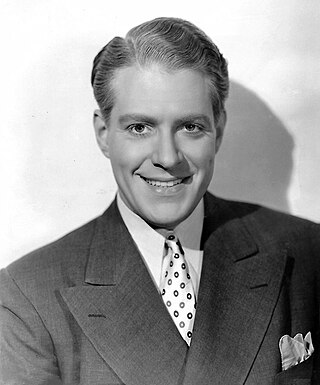
Nelson Ackerman Eddy was an American actor and baritone singer who appeared in 19 musical films during the 1930s and 1940s, as well as in opera and on the concert stage, radio, television, and in nightclubs. A classically trained baritone, he is best remembered for the eight films in which he costarred with soprano Jeanette MacDonald. He was one of the first "crossover" stars, a superstar appealing both to shrieking bobby soxers and opera purists, and in his heyday, he was the highest paid singer in the world.

William Brian de Lacy Aherne was an English actor of stage, screen, radio and television, who enjoyed a long and varied career in Britain and the United States.
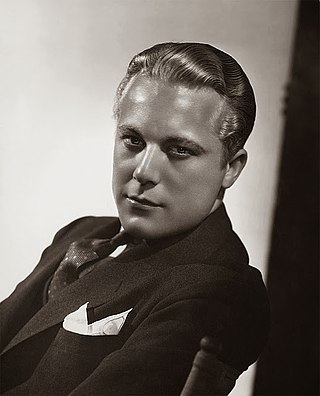
Gene Raymond was an American film, television, and stage actor of the 1930s and 1940s. In addition to acting, Raymond was also a singer, composer, screenwriter, director, producer, and decorated military pilot.

The Vagabond King is a 1930 American Pre-Code musical operetta film photographed entirely in two-color Technicolor. The plot of the film was based on the 1925 operetta of the same name, which was based on the 1901 play If I Were King by Justin Huntly McCarthy. The play told the story of the real-life renegade French poet named François Villon. The music of the film was based on a 1925 operetta, also based on the play If I Were King by McCarthy. The operetta is also titled The Vagabond King with music by Rudolph Friml and lyrics by Brian Hooker and W.H. Post. The film was nominated for an Academy Award for Best Art Direction.

Sweethearts is a 1938 American Technicolor musical romance film directed by W.S. Van Dyke and starring Jeanette MacDonald and Nelson Eddy. The screenplay, by Dorothy Parker and Alan Campbell, uses the “play within a play” device: a Broadway production of the 1913 Victor Herbert operetta is the setting for another pair of sweethearts, the stars of the show. It was the first color film for Nelson or Jeanette. It was their first film together without uniforms or period costumes.
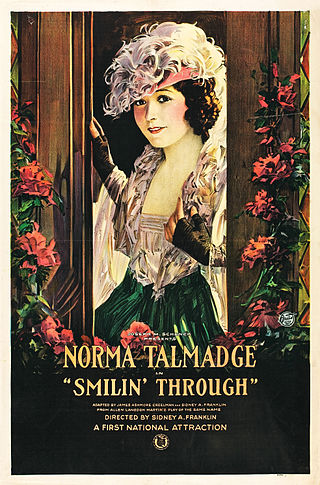
Smilin' Through is a 1922 American silent drama film based on the 1919 play of the same name, written by Jane Cowl and Jane Murfin. The film starred Norma Talmadge, Harrison Ford, and Wyndham Standing. It was co-written and directed by Sidney Franklin, who also directed the more famous 1932 remake at MGM. The film was produced by Talmadge and her husband Joseph M. Schenck for her company, the Norma Talmadge Film Corporation. It was released by First National Pictures. Popular character actor Gene Lockhart made his screen debut in this film.
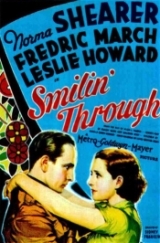
Smilin' Through is a 1932 American pre-Code MGM romantic drama film based on the 1919 play of the same name written by Jane Cowl and Jane Murfin under the pseudonym of Allan Langdon Martin. It was adapted from the play by James Bernard Fagan, Donald Ogden Stewart, Ernest Vajda and Claudine West. The film was directed by Sidney Franklin and stars Norma Shearer, Fredric March, Leslie Howard and Ralph Forbes.
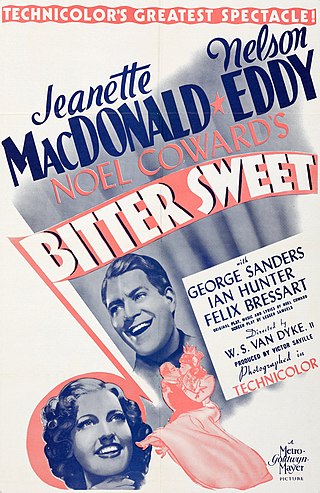
Bitter Sweet is a 1940 American Technicolor musical film directed by W. S. Van Dyke, based on the operetta Bitter Sweet by Noël Coward. It was nominated for two Academy Awards, one for Best Cinematography and the other for Best Art Direction by Cedric Gibbons and John S. Detlie.
Smilin' Through may refer to:

"Smilin' Through" is a popular ballad with lyrics and music by Arthur A. Penn.
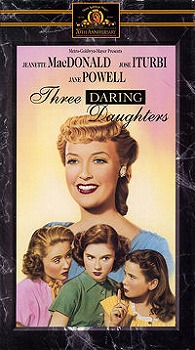
Three Daring Daughters is a 1948 American Technicolor musical film directed by Fred M. Wilcox and starring Jeanette MacDonald, Jane Powell and Edward Arnold. It was produced and released by Metro-Goldwyn-Mayer. The screenplay was written by Albert Mannheimer, Frederick Kohner, Sonya Levien and John Meehan.

Broadway Serenade is a 1939 musical drama film distributed by MGM, produced and directed by Robert Z. Leonard. The screenplay was written by Charles Lederer, based on a story by Lew Lipton, John Taintor Foote and Hanns Kräly. The music score is by Herbert Stothart and Edward Ward.

Three Sailors and a Girl is a 1953 American Technicolor musical film made by Warner Bros. It was directed by Roy Del Ruth and written by Devery Freeman and Roland Kibbee, based on the George S. Kaufman play The Butter and Egg Man. Ray Heindorf was the musical director, with orchestrations by Gus Levene, and vocal arrangements by Norman Luboff. Choreography was by LeRoy Prinz.
The Water Gipsies is a 1932 British, low-budget "quota quickie" drama film directed by Maurice Elvey and starring Ann Todd, Sari Maritza and Ian Hunter. It is an adaptation of the 1930 novel The Water Gipsies by A.P. Herbert. The film was made at Beaconsfield Studios. Vivian Ellis worked as the film's composer, and later used some of the music in the 1955 stage musical adaptation of the novel.

The following features lists of the film, television and stage performances of actress and singer Jeanette MacDonald. She is best remembered for her musical films of the 1930s with Maurice Chevalier and Nelson Eddy, but she starred in 29 feature films between 1929 and 1950, from operas to dramas to romantic comedies.
The 1995 Queen's Birthday Honours in New Zealand, celebrating the official birthday of Elizabeth II, were appointments made by the Queen in her right as Queen of New Zealand, on the advice of the New Zealand government, to various orders and honours to reward and highlight good works by New Zealanders. They were announced on 17 June 1995.














